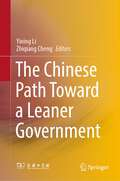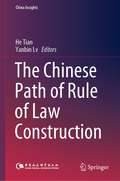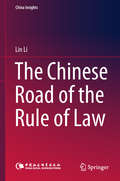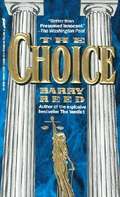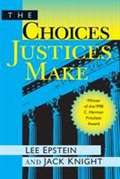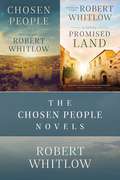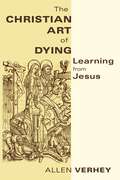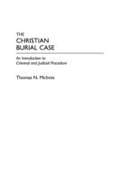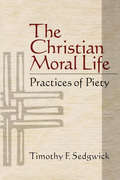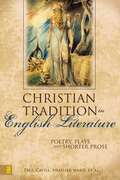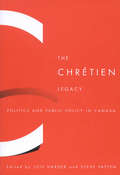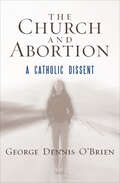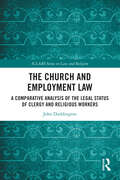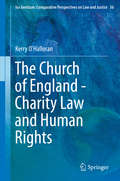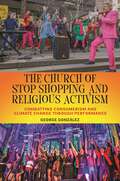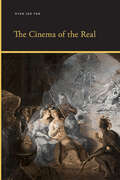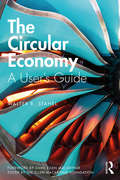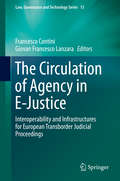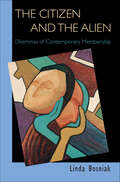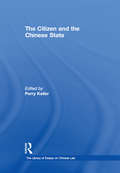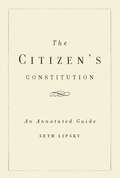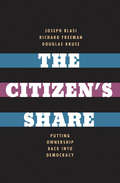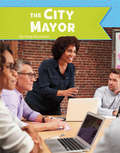- Table View
- List View
The Chinese Path Toward a Leaner Government
by Yining Li Zhiqiang ChengThis book focuses on the administration streamlining aligned with the market-oriented reform process in China. The book is divided into two parts. The first part clarifies why administration is necessary and important, what it covers, and how to deal with the relation between the central and the local governments. The second part presents empirical analysis in specific areas, including agricultural reform, fiscal reform, government reform and education reform, and a series of decentralization reforms. This book is a collective wisdom from Peking University and is edited by Chinese economist Yining Li.
The Chinese Path of Rule of Law Construction (China Insights)
by He Tian Yanbin LvThis book provides law-based governance which is one of the basic policies that underpins our endeavors to uphold and develop socialism with Chinese characteristics in the new era. Law is the key to governing the country,and the rule of law is an important support for the national governance system and governance capacity. Since the 18th National Congress of the CPC,China has implemented the four-pronged comprehensive strategy and created an unprecedented new situation for law-based governance. Further progress has been made in ensuring China’s legislation is sound,law enforcement is strict, the administration of justice is impartial,and the law is observed by everyone. China’s efforts to build a country, government,and society based on the rule of law have been mutually reinforcing; the system of distinctively Chinese socialist rule of law has been steadily improved; public awareness of the rule of law has risen markedly. In recent years, China has adhered to the correct handling of the relationship between deepening reform and law-based governance,ensuring that major reforms are justified by law and providing solid guarantees of the rule of law for reform and opening-up. China has adhered to combine law-based governance of the country and rule-based governance over the party and exercised law-based governance at every point in the process and over every dimension of full and rigorous governance over the party and has made remarkable achievements in the construction of a clean and honest government and the struggle against corruption.
The Chinese Road of the Rule of Law (China Insights)
by Lin Li Xiaoqing BiThis book studies the practical experience and theoretical development of rule of law in China, and provides fundamental theory for the construction of rule of law in contemporary China. The author examines the rule of law by exploring the entire legal system, and highlighting various aspects including the legislation, law enforcement and supervision systems. Readers will also discover the author’s strong opinions on scientific legislation, legal government, judicial reform, and the culture of rule of law. This highly readable book will appeal to both general readers and researchers interested in rule of law in China.
The Choice
by Barry ReedFrank Galvin, a smart Irishman from the tough side of town, is the star litigator at a blue-chip Boston law firm. But the irresistible lure of a beautiful woman with a devastating secret threatens his hard-won acceptance by "the establishment." Suddenly, Frank finds himself on the wrong side of a ferocious legal war--hired to destroy the people he trusts, loyal to those he doesn't. He's facing the biggest choice of his career-and the ultimate battle between duty and honor. Caught in the crossfire of sexual temptation and murder, he'll call on the same unorthodox methods that made things sizzle in The Verdict. But this time, Galvin's got a lot more at stake, because winning the case could mean losing everything.
The Choices Justices Make
by Lee Epstein Jack KnightThe Choices Justices Make is a groundbreaking work that offers a strategic account of Supreme Court decision making. Justices realize that their ability to achieve their policy and other goals depends on the preferences of other actors, the choices they expect others to make, and the institutional context in which they act. All these factors hold sway over justices as they make their decisions, from which cases to accept, to how to interact with their colleagues, and what policies to adopt in their opinions. Choices is a thought-provoking, yet nontechnical work that is an ideal supplement for judicial process and public law courses. In addition to offering a unique and sustained theoretical account, the authors tell a fascinating story of how the Court works. Data culled from the Court's public records and from the private papers of Justices Brennan, Douglas, Marshall, and Powell provide empirical evidence to support the central argument, while numerous examples from the justices' papers animate the work.
The Chosen People Novels: Chosen People and Promised Land (A Chosen People Novel #2)
by Robert WhitlowBestselling author Robert Whitlow presents an international legal drama with historical mysteries, religious intrigue, and political danger that speaks to critical issues of our day in these two novels now available in one collection.Chosen PeopleHana Abboud is a Christian Arab Israeli lawyer currently living and practicing in Atlanta. When a partner in her law firm comes to her with a special case, she joins forces with Jakob Brodsky, a young Jewish lawyer, and Daud Hasan, an Arab investigator, to seek justice for one little girl. To unravel the case, this team will travel from the streets of Atlanta to the alleys of Jerusalem, a world where hidden motives thrive, the risk of death is real, and the search for truth has many faces. What they uncover will forever change their understanding of justice, heritage, and what it means to be chosen for a greater purpose.Promised LandBestselling author Robert Whitlow explores the meaning of family and home—and how faith forms the identity of both—in this breathtaking follow-up to Chosen People.
The Christian Art of Dying: Learning from Jesus
by Allen VerheyA renowned ethicist who himself faced death during a recent life-threatening illness, Allen Verhey in The Christian Art of Dying sets out to recapture dying from the medical world. Seeking to counter the medicalization of death that is so prevalent today, Verhey revisits the fifteenth-century Ars Moriendi, an illustrated spiritual self-help manual on "the art of dying." Finding much wisdom in that little book but rejecting its Stoic and Platonic worldview, Verhey uncovers in the biblical accounts of Jesus' death a truly helpful paradigm for dying well and faithfully.
The Christian Burial Case: An Introduction to Criminal and Judicial Procedure
by Thomas N. McinnisOn December 24, 1968, ten-year-old Pamela Powers was brutally murdered, her body dumped at the side of the road to freeze. Robert Anthony Williams was charged with the crime, and a series of trials, appeals, and reversals ensued. "The Christian Burial Case: An Introduction to Criminal and Judicial Procedure" introduces readers to the intricacies of the American legal system, using the Williams case to illustrate all the stages of the legal process from the point of arrest, to the trial, the appellate process, and, ultimately, the Supreme Court. The text clearly and concisely explains criminal and court procedures in the context of the Williams case, paying careful attention to the rights against self-incrimination and to counsel, and to the role of the exclusionary rule in our system of justice. This unique introduction to criminal justice and judicial procedure captures the imagination of the reader as it chronicles The Christian Burial case from beginning to end. Because the suspect was observed leaving the scene of the crime with the body of the victim, the Williams case seemed to be open and shut. But due to police procedures in apprehending and questioning the suspect, the resolution of the case took fifteen years and two United States Supreme Court decisions. By highlighting the difficulties of determining the facts of the case and the proper procedural laws that were applicable, McInnis demonstrates the complexities inherent in the legal system. This compelling book is a must-read for all people interested in learning more about criminal procedure and judicial processes.
The Christian Ethos
by Werner Elert Carl J. SchindlerAs mentioned in the introduction of the book, The Christian Ethos cannot be simply defined as 'response to law,' either human or divine. The normative character of theological ethics must rest upon other foundations.
The Christian Moral Life: Practices of Piety
by Timothy F. SedgwickWhat makes someone a Christian? The way of life we call Christian is lived in relationships to others. Christian faith, understood as practical piety, calls for a life opened to the world at large, concerned for the “stranger” as well as for the neighbor. This exploration of morality by Timothy Sedgwick emphasizes that the Christian life is grounded in the experience and worship of God. His work develops Christian ethics as “sacramental ethics”—an ethic that has at its center a deepening encounter with God. Written in an accessible style, this book provides teachers, pastors, counselors, and general readers with an ideal introduction to Christian ethics. It renews the topic by showing that faithful moral living is achieved through the daily practices of grace and godliness. First exploring the foundations of Christian ethics as seen by both Catholics and Protestants, and then developing a constructive view of morality as a way of life, Sedgwick shows that effective piety is built on spiritual disciplines that deepen our experience of God: prayer, worship, self examination, simplicity, and acts of hospitality.
The Christian Tradition in English Literature: Poetry, Plays, And Shorter Prose
by Heather Ward Paul CavillFeatures:• Wide chronological coverage of English literature, especially texts found in the Norton, Oxford, Blackwell and other standard anthologies• Short, punchy essays that engage with the texts, the critics, and literary and social issues• Background and survey articles• Glossaries of Bible themes, images and narratives• Annotated bibliography and questions for class discussion or personal reflection• Scholarly yet accessible, jargon-free approach – ideal for school and university students, book groups and general readersCreated for readers who may be unfamiliar with the Bible, church history or theological development, it offers an understanding of Christianity’s key concepts, themes, images and characters as they relate to English literature up to the present day.
The Christmas Murders
by Jonathan Goodman[from inside flaps] "Following the success of his three previous collections (The Pleasures of Murder, The Railway Murders and The Seaside Murders), Jonathan Goodman now presents a seasonal gift for connoisseurs of true crime. Here are ten murder cases of "the old-fashioned sort--evoking a nostalgia more obviously associated with fiction--which all took place during the festive period from mid-December to Twelfth Night between 1811 and 1933. The widely various settings range from the Knickerbocker Athletic Club in New York (where a gentleman named Molineux provided a drastic cure for hangovers by putting cyanide in a gift-wrapped bottle of Bromo Seltzer) to an apartment in Glasgow (home of a wealthy Scots woman whose demise seemed to have been satisfactorily explained by local constables, until Arthur Conan Doyle assumed the role of Sherlock Holmes); from a builder's workshop in North London (site of a murder committed by a man called Furnace, who suited his criminal action to his name) to the elegant dwelling of a menage a trois near the Thames (scene of a puzzling poisoning that, years later, Raymond Chandler tried, unofficially, to solve). In The Christmas Murders, Jonathan Goodman has come up with a collection as fascinating and compulsively readable as one would expect from a writer described by Jacques Barzun as "the greatest living master of true-crime literature" and by Julian Symons as "the premier investigator of crimes past"."
The Chrétien Legacy: Politics and Public Policy in Canada
by Steve Patten Lois HarderThe legacy of Jean Chrétien, Canadian prime minister from 1993-2003, is difficult to assess in the context of the sponsorship scandal and the subsequent cloud of uncertainty surrounding the Liberal Party's electoral prospects. The contributors to this volume use their considerable experience and expertise as policy observers and critical thinkers to provide provocative essays that analyse Chrétien's government and provide insights into Canadian politics and public policy.
The Church and Abortion: A Catholic Dissent
by George Dennis O'BrienThis provocative book takes a critical look at what is increasingly viewed as the central political issue for Catholics—abortion. From pro-choice politicians being denied communion to Democrats being called "the party of death," for some of the most vocal Catholic leaders, the abortion issue often trumps all others. The author, a practicing Catholic who is against abortion in principle, believes the Church is on the wrong course with this issue, with grievous results for the Church and American society more broadly. He gives a brief history of abortion legislation, then explores the issue from legal, moral, and Christian perspectives, presenting compelling reasons why Church leaders and Catholics should stop trying to overturn Roe v. Wade and reconsider the issue.
The Church and Employment Law: A Comparative Analysis of The Legal Status of Clergy and Religious Workers (ICLARS Series on Law and Religion)
by John DuddingtonThis book examines the current law on the employment status of ministers of religion together with religious workers and volunteers and suggests reforms in this area of the law to meet the need for ministers to be given a degree of employment protection. It also considers the constant theme in Christian history that the clergy should not be subject to the ordinary courts and asks whether this is justified with the growth of areas such as employment law. The work questions whether it is possible to arrive at a satisfactory definition of who is a minister of religion and, along with this, who would be the employer of the minister if there was a contract of employment. Taking a comparative perspective, it evaluates the case law on the employment status of Christian and non-Christian clergy and assesses whether this shows any coherent theme or line of development. The work also considers the issue of ministerial employment status against the background of the autonomy of churches and other religious bodies from the State, together with their ecclesiology. The book will be of interest to academics and researchers working in the areas of law and religion, employment law and religious studies, together with both legal practitioners and human resources practitioners in these areas.
The Church of England - Charity Law and Human Rights
by Kerry O'HalloranThis book examines the interface between religion, charity law and human rights. It does so by treating the Church of England and its current circumstances as a timely case study providing an opportunity to examine the tensions that have now become such a characteristic feature of that interface. Firstly, it suggests that the Church is the primary source of canon law principles that have played a formative role in shaping civic morality throughout the common law jurisdictions: the history of their emergence and enforcement by the State in post-Reformation England is recorded and assessed. Secondly, it reveals that of such principles those of greatest weight were associated with matters of sexuality: in particular, for centuries, family law was formulated and applied with regard for the sanctity of the heterosexual marital family which provided the only legally permissible context for any form of sexual relationship. Thirdly, given that history, it identifies and assesses the particular implications that now arise for the Church as a consequence of recent charity law reform outcomes and human rights case law developments: a comparative analysis of religion related case law is provided. Finally, following an outline of the structure and organizational functions of the Church, a detailed analysis is undertaken of its success in engaging with these issues in the context of the Lambeth Conferences, the wider Anglican Communion and in the ill-fated Covenant initiative. From the perspective of the dilemmas currently challenging the moral authority of the Church of England, this book identifies and explores the contemporary 'moral imperatives' or red line issues that now threaten the coherence of Christian religions in most leading common law nations. Gay marriage and abortion are among the host of morally charged and deeply divisive topics demanding a reasoned response and leadership from religious bodies. Attention is given to the judicial interpretation and evaluation of these and other issues that now undermine the traditional role of the Church of England. As the interface between religion, charity law and human rights becomes steadily more fractious, with religious fundamentalism and discrimination acquiring a higher profile, there is now a pressing need for a more balanced relationship between those with and those without religious beliefs. This book will be an invaluable aid in starting the process of achieving a triangulated relationship between the principles of canon law, charity law and human rights law.
The Church of Stop Shopping and Religious Activism: Combatting Consumerism and Climate Change through Performance (North American Religions)
by George GonzálezExplores the religious activism of the Stop Shopping Church performance groupSince the dawn of the new millennium, the grassroots performance activist group the Stop Shopping Church has advanced a sophisticated anti-capitalist critique in what they call “Earth Justice.” Led by co-founders, Reverend Billy and Savitri D, the Church of Stop Shopping have sung with Joan Baez and toured with Pussy Riot and Neil Young. They performed at festivals around the world, and been the subject of the nationally released documentary, What Would Jesus Buy? They opposed the forces of consumerism on the global stage, and taken on the corporate practices of Disney, Starbucks, J.P. Morgan Chase Bank, Walmart, Amazon, and many others. While the Church maintains an anti-consumerism stance at its core–through performances, street actions, and social activism–the community also prioritizes work for racial justice, queer liberation, justice and sanctuary for immigrants, First Amendment issues, the reclaiming of public space, and in an increasingly central way, environmental justice. In The Church of Stop Shopping and Religious Activism, George González draws on interviews, participant observation, and digital ethnography to offer insight into the Church, its make up, its activities, and in particular, how it has shifted over time from parody to a deep and serious engagement with religion. Reverend Billy and the Church of Stop Shopping maintain that corporations and their celebrity spokespeople operate in much the same way churches do. González uses the group’s performance activism to showcase the links between religion, the culture of capitalist consumerism, and climate catastrophe and to analyze the ways in which consumers are ritualized into accepting capitalism and its consequences. He argues that the members and organizers of the Church of Stop Shopping are serious theorizers and users of religion in their own right, and that they offer keen insights into our understanding of ritualistic consumerism and its indelible link to the rising sea levels that threaten to engulf us all.
The Cinema of the Real (SUNY series, Insinuations: Philosophy, Psychoanalysis, Literature)
by Hyon Joo YooA significant intervention into Lacanian film studies, this book sets forth a new theory of the psychoanalytic Real in cinema. In psychoanalysis, the Real ruptures the Symbolic that organizes law, ideology, and other systems of belief, revealing fissures in this underlying order. The Cinema of the Real explores how transnational cinema and especially South Korean cinema facilitate an encounter with the Real, enabling the emergence of a new political subject. Paying close attention to form, Hyon Joo Yoo reveals the existence of an "emancipatory drive" in films by Jang Hun, Park Chan-wook, Lee Chang-dong, Jia Zhangke, Michael Haneke, Claire Denis, and Bong Joon-ho, among others. Their work in effect provides viewers with a picture of how it looks and feels to be on a trajectory in which the subject and her world can change. Far from being a passive consumer of images, Yoo's spectator enters the space of the Real. Theoretically rigorous and inventive, The Cinema of the Real offers new, transnationally attuned tools for conceptualizing the body, affect, femininity, and spectatorship, as well as fresh readings of both classic and contemporary films.
The Circular Economy: A User's Guide
by Walter R StahelA Circular Economy seeks to rebuild capital, whether this is financial, manufactured, human, social or natural, and offers opportunities and solutions for all organisations. This book, written by Walter Stahel, who is widely recognised as one of the key people who formulated the concept of the Circular Economy, is the perfect introduction for anyone wanting to quickly get up to speed with this vitally important topic for ensuring sustainable development. It sets out a new framework that refines the concept of a Circular Economy and how it can be applied at industrial levels. This concise book presents the key themes for busy managers and policymakers and some of the newest thinking on the topic of the Circular Economy from one of the leading thinkers in the field. Practical examples and case studies with real-life data are used to elucidate the ideas presented within the book.
The Circulation of Agency in E-Justice
by Giovan Francesco Lanzara Francesco ContiniThis book contributes to an understanding of the dynamic complexities involved in the design of e-justice applications that enable online trans-border judicial proceedings in Europe. It provides answers to critical questions with practical relevance: How should online trans-border judicial proceedings be designed in order to deliver effective and timely justice to European citizens, businesses and public agencies? How can the circulation of judicial agency across Europe be facilitated? Based on extensive research, the book explores and assesses the complex entanglements between law and technology, and between national and European jurisdictions that emerge when developing even relatively simple e-services such as those supporting the European small claims procedure and European payment orders. In addition to providing a strong theoretical framework and an innovative approach to e-justice design, this book includes case studies that are based on a common methodology and theoretical framework. It presents original empirical material on the development of e-government systems in the area of European justice. Finally, it introduces the design strategies of Maximum Feasible Simplicity and Maximum Manageable Complexity and, based on them, it proposes architectural and procedural solutions to enhance the circulation of judicial agency.
The Citizen and the Alien: Dilemmas of Contemporary Membership
by Linda BosniakCitizenship presents two faces. Within a political community it stands for inclusion and universalism, but to outsiders, citizenship means exclusion. Because these aspects of citizenship appear spatially and jurisdictionally separate, they are usually regarded as complementary. In fact, the inclusionary and exclusionary dimensions of citizenship dramatically collide within the territory of the nation-state, creating multiple contradictions when it comes to the class of people the law calls aliens--transnational migrants with a status short of full citizenship. Examining alienage and alienage law in all of its complexities, The Citizen and the Alien explores the dilemmas of inclusion and exclusion inherent in the practices and institutions of citizenship in liberal democratic societies, especially the United States. In doing so, it offers an important new perspective on the changing meaning of citizenship in a world of highly porous borders and increasing transmigration. As a particular form of noncitizenship, alienage represents a powerful lens through which to examine the meaning of citizenship itself, argues Linda Bosniak. She uses alienage to examine the promises and limits of the "equal citizenship" ideal that animates many constitutional democracies. In the process, she shows how core features of globalization serve to shape the structure of legal and social relationships at the very heart of national societies.
The Citizen and the Chinese State (The Library of Essays on Chinese Law)
by Perry KellerThis volume addresses several core questions regarding the nature of law in China and its future development. In particular, these articles shed light on whether the rule of law ideal is commensurable with government based on the Chinese Communist Party. Beginning virtually from scratch, China has established a comprehensive legal system that boasts a constitution, primary and secondary legislation and plentiful regulations covering most areas of public and private life. Yet, as these articles discuss, its courts are enmeshed in Party and state hierarchies and are not empowered to directly apply constitutional principles or rights, ensuring that the law is subordinate to national public policy goals. Legal and extra-legal methods for punishing wrongdoing and resolving disputes also raise questions of due process of law. Ultimately, the question is therefore whether China's legal system, if eschewing formalised human rights, is developing a capacity to protect fundamental human dignity.
The Citizen's Constitution
by Seth LipskyAn Elements of Style for how our government is supposed to work
The Citizen's Share
by Douglas L. Kruse Richard B. Freeman Joseph R. BlasiThe idea of workers owning the businesses where they work is not new. In America's early years, Washington, Adams, Jefferson, and Madison believed that the best economic plan for the Republic was for citizens to have some ownership stake in the land, which was the main form of productive capital. This book traces the development of that share idea in American history and brings its message to today's economy, where business capital has replaced land as the source of wealth creation. Based on a ten-year study of profit sharing and employee ownership at small and large corporations, this important and insightful work makes the case that the Founders' original vision of sharing ownership and profits offers a viable path toward restoring the middle class. Blasi, Freeman, and Kruse show that an ownership stake in a corporation inspires and increases worker loyalty, productivity, and innovation. Their book offers history-, economics-, and evidence-based policy ideas at their best.
The City Mayor (U.S. Government)
by Amy KortuemWhat does a city mayor do? Learn about the duties of a city mayor and how the mayor serves people in the city. Descriptive main text, full-color photos, fast facts, and callout definitions work together to support understanding.
